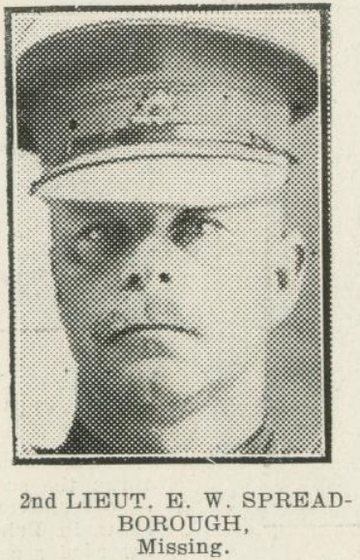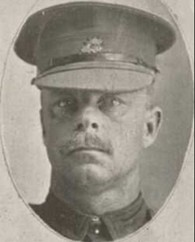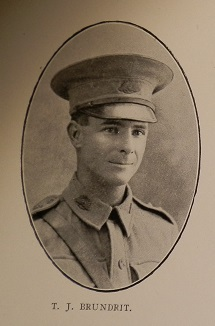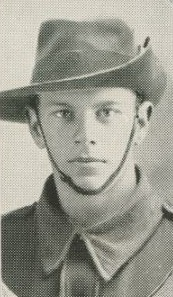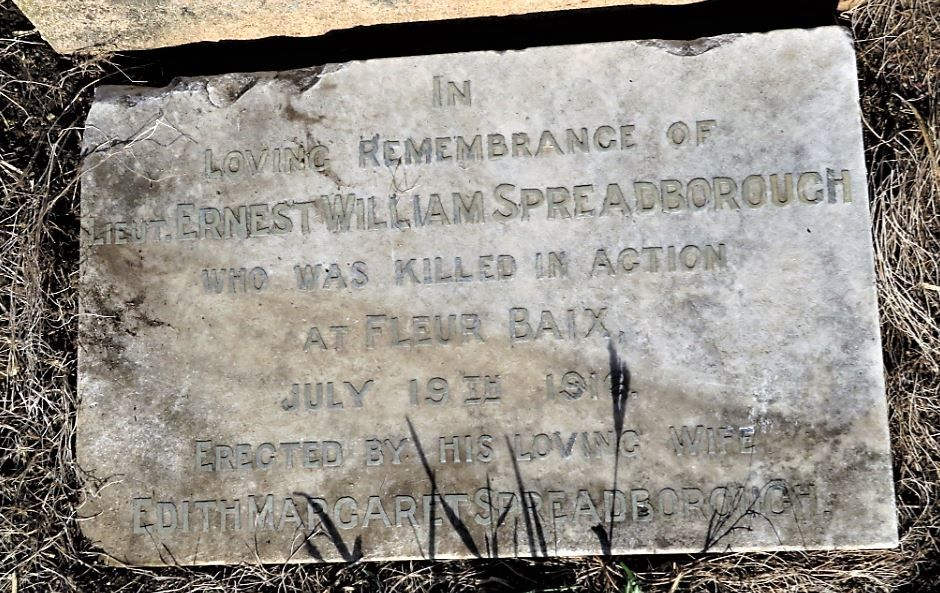Ernest William SPREADBOROUGH
Eyes blue, Hair fair, Complexion fair
From Chalkboard to Battlefield - Lieutenant Ernest Spreadborough
Can you help us identify Ernest?
Lieutenant Ernest William Spreadborough was killed in action during the Battle of Fromelles on 19 July 1916. His body was seen lying in No-Man’s-Land shortly after the attack, and 2 months later his identity disc was recovered from remains on the battlefield. However, he was never formally buried or identified, and has no known grave.
Like many of the missing from Fromelles, it is possible that Ernest was among those buried by the Germans in mass graves behind their lines — graves that were rediscovered near Pheasant Wood in 2008. But evidence above says he is more likely buried at VC Corner.
Family have already come forward and provided DNA. If you are related and would like to support the ID or elimination, or know someone who might be a descendant of his extended family, please contact the Fromelles Association of Australia.
Early Life
Ernest William Spreadborough was born on 12 December 1874 in Warwick, Queensland. He was the eldest child of John Spreadborough (18150-1918) — a highly respected public servant who served for decades as the Town Clerk of Warwick — and Ann Elizabeth née Glasby (1854-1934). John’s ancestors came from Surrey England in 1848, while Ann’s family arrived in 1854, from Yorkshire.
As the eldest, Ernest grew up with nine siblings:
- Ernest William , 1874-1916 Fromelles
- Grace Mary, 1876-1898
- John , 1877-1877 died in infancy.
- Arthur Joseph, 1879-1949 m Ivy Houghton
- Cuthbert John , 1881-1942 m E Smith and then E Ahern
- Edgar Knight, 1884-1925 m Margaret McNamara
- Bertha Ellerby, 1886-1945 m Thomas Flood
- Dora Glasby, 1887-1948
- Florence Laura, 1890-1971 m David Hyslop
- Harold Isaac, 1894-1976 m Mavis Brunton
Ernest received his education at the Warwick Boys’ School and later trained as a teacher. He went on to serve in schools across Queensland, earning a reputation for his dedication to education and leadership. He was known to have worked for many years at the Central State School for Boys in Warwick under Mr James Porter, and eventually held headmaster positions including at Brandon and Mount Beppo State Schools.
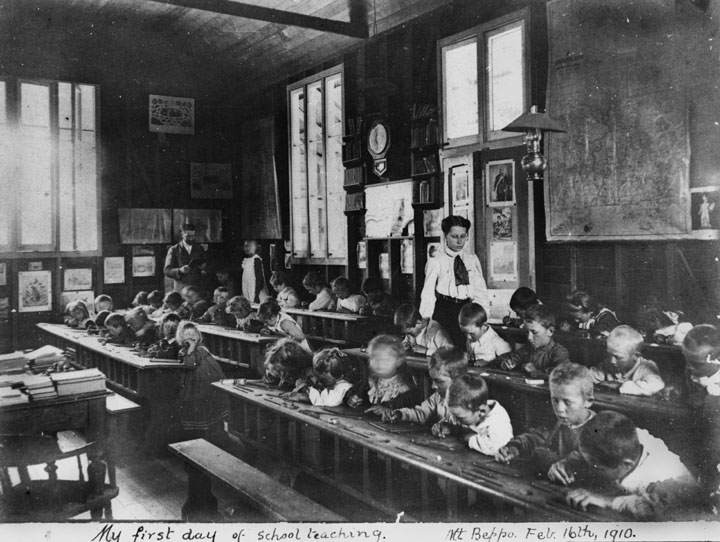
By the time war broke out in 1914, Ernest had been teaching for many years and was a Certified Instructor with the Junior Cadets. He was married to Edith Margaret Hamilton in 1900. The couple lived in Clayfield, Brisbane, and Ernest was 41 years old when he enlisted in the AIF on 4 June 1915 — one of many older, educated men who felt compelled to serve their country despite their age and responsibilities.Three members of Ernest’s family served in the First AIF:
- 3433 Private Arthur Joseph Spreadborough, his younger brother, served with the 5th Light Horse Regiment. He embarked in 1917 and returned to Australia in 1919.
- 452 Private Harold Isaac Spreadborough, another brother, was among the first to enlist in 1914, serving with the 9th Battalion at Gallipoli before being wounded and returned home in 1915.
- Honorary Lieutenant Thomas Joseph Brundrit, Ernest’s brother-in-law, (his wife’s half-brother) served as Quartermaster with the 5th Light Horse Regiment. He was killed in action at Gallipoli on 8 November 1915 and was Mentioned in Despatches for his service. He is buried at Shell Green Cemetery, Gallipoli.
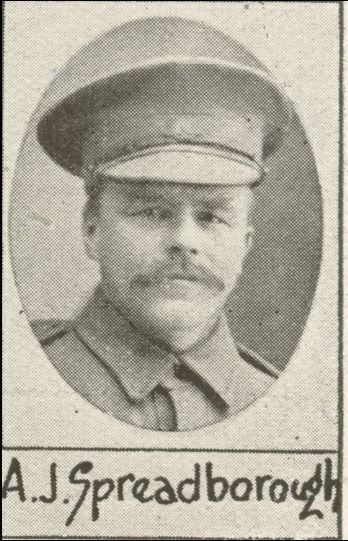
The Spreadborough family’s wartime record speaks to a legacy of deep commitment and personal sacrifice.
Off to War
When Ernest enlisted on 4 June 1915, he was already 41 years old — a mature and experienced schoolteacher, husband, and cadet instructor. His leadership skills and background made him an ideal officer candidate, and he was commissioned as a Second Lieutenant in B Company of the newly raised 31st Battalion. The 31st Battalion was formed in Queensland and Victoria and included many men from regional towns and farming communities. Training commenced at Enoggera and continued at Broadmeadows, where the battalion prepared for overseas service.
Ernest’s dedication and aptitude for command saw him promoted to Lieutenant in March 1916. He embarked with B Company aboard HMAT A62 Wandilla from Melbourne on 9 November 1915. After arriving in Egypt in early December, the battalion spent several months training and defending the Suez Canal. In mid-1916, the 31st Battalion was transferred to France to join the British Expeditionary Force on the Western Front.
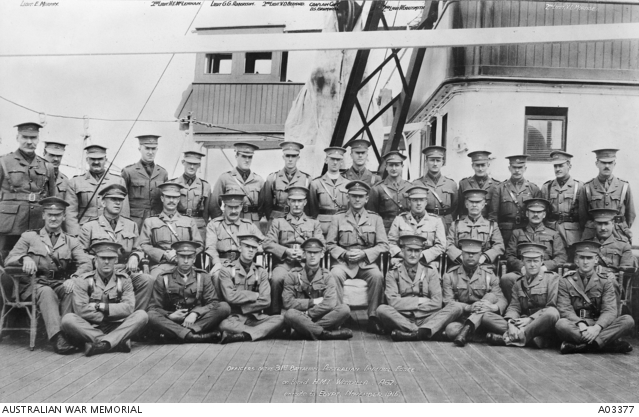
Ernest disembarked at Marseilles on 23 June 1916. Within weeks, he and his men would be rushed into one of the most catastrophic battles Australia would fight in the First World War — the attack at Fromelles.
The Battle of Fromelles
Only weeks after arriving in France, the 31st Battalion was ordered into action at Fromelles — a quiet sector that would become the scene of appalling loss. On 19 July 1916, the 5th Australian Division, including Ernest’s 31st Battalion, was tasked with launching a diversionary assault near the village of Fleurbaix to draw German attention away from the Somme offensive further south. The plan was fatally flawed from the start. The ground was waterlogged, the German positions were heavily fortified and elevated, and the preliminary artillery barrage had failed to significantly damage enemy defences. The Australian infantry would be advancing over flat, exposed ground — some 100 to 200 metres of No-Man’s-Land — directly into machine gun and artillery fire.

The 31st Battalion formed part of the 8th Brigade, which was on the extreme left of the Australian line. Ernest was a platoon commander in B Company. Just before the attack, B Company’s commanding officer, Captain Sharpe, was wounded, and Ernest — as senior lieutenant — took command of the company. From multiple eyewitness accounts, we know that Ernest led his men forward with bravery and determination. Private F.W. Schilt of the 31st later gave the following statement to the Red Cross:
“I was carrying ammunition on the night of July 19th at Fleurbaix during the advance. Just before I left our trenches with the first box I spoke to Lt. Spreadborough, who told me that Capt. Sharpe of B Coy was wounded and he was now in charge of the Coy. I made the remark that I wished him luck and went off to the Dump for the ammunition. I took the box and started across. He had preceded me and on the way over I saw him fall. He dropped, apparently killed outright by M/G fire from the extreme right. I passed close to where he lay and he did not move. He was only about 30 yards from our front line when he went down.”
Two other witnesses, Privates J. Goddard and S. Leckie, also confirmed his fate:
“On July 19th 1916 at Fleurbaix near Armentieres, Lieut. Spreadborough was killed. They were in a bayonet charge on German trenches, and he was killed by shell shot instantaneously. Leckie says he was just behind him and saw him fall. Goddard says he saw him after he was killed, but being in charge could not stop and does not know if he was buried. It was on No Man’s Land.”
The next day, the 31st Battalion’s position was overrun on both flanks. The men had advanced too far and without adequate support. By dawn on 20 July, the survivors were forced to withdraw. Many, like Ernest, remained lying in No-Man’s-Land. Weeks later, on 9 September 1916, a battlefield recovery party found a badly decomposed body just 30 yards from the front trench. The body had no visible signs of burial, but an identity disc confirmed it was Lieutenant Spreadborough. As the file noted:
“Lieut. SPREADBOROUGH... Killed instantaneously by a machine gun bullet in attack at FROMELLES on 19/20.7.16. Identity disc was removed from body lying in N.M.L. on 9.9.16, but no record is available where body was buried.”— Adjutant for CO
The personal items recovered — his disc, photos, and a leather case — were forwarded to the A.I.F. Kit Store in London. But his remains were never identified or officially buried.
Aftermath
A 1919 postwar investigation into the missing at Fromelles found “no trace Germany,” confirming Ernest had not been buried by enemy forces. Like hundreds of others who fell that night, his name is etched on the V.C. Corner Australian Cemetery Memorial — a place of remembrance for those with no known grave.
For weeks after the disastrous attack at Fromelles, Ernest William Spreadborough’s fate remained uncertain. His name appeared among the many missing, and his wife Edith received the dreaded cable notifying her that he had failed to return:
“Mrs E. W. Spreadborough has received a cablegram from France notifying that her husband, Lieut. E. W. Spreadborough, one time headmaster of Brandon State School, has been missing since July 20.”
At the time, Edith was living in Gympie with her sister, Mrs A. J. Macfie, far from the home she had shared with Ernest in Clayfield. The confirmation of his death would not arrive until October, when official records finally declared that Ernest had been killed in action during the assault. Ernest’s parents, John and Ann Spreadborough of Warwick, were devastated by the loss of their eldest son. In July 1918 — two years after his death — they placed a poignant memorial in The Telegraph. The grief weighed particularly heavily on Ernest’s father.
John Spreadborough, a devoted public servant who had worked with the Warwick Town Council for over 35 years, never recovered. A heartfelt obituary published upon his death in 1918 spoke of the quiet devastation Ernest’s loss had brought:
“The death of his eldest son, Lieut. Ernest Spreadborough, in action in France, was a great blow to him, and though he turned a smiling face to the world, infinite sorrow was slowly consuming him.”
Ernest was just shy of 42 years old when he fell at Fromelles. He left behind his wife, Edith; his siblings; and a grieving town that had once known him as a dedicated teacher and proud son of Warwick. Despite recovery of his identity disc in September 1916, no record of a burial was ever found. Ernest has no known grave.
In His Honour
Lieutenant Ernest William Spreadborough is remembered as both a soldier and a schoolmaster — a man of intellect, duty, and compassion who gave his life leading his men during the first major action of the 31st Battalion at Fromelles.
His name is commemorated at:
- V.C. Corner Australian Cemetery Memorial, Fromelles, France (No. MR 7)
- Australian War Memorial, Canberra – Roll of Honour, Panel 119
- Warwick War Memorial, Queensland – his hometown
Two years after his death, his family placed a moving memorial verse in The Telegraph, marking his sacrifice:
“Lieut. E. W. Spreadborough, who was killed while leading his men at Fleurbaix, July 19–20, 1916.I do believe that just the same sweet face,But glorified, is waiting in the place,Where we shall meet, if only IAm counted worthy in that by and bye.”—Inserted by his parents and brothers and sisters
In Warwick, his father’s obituary made it clear that Ernest's legacy extended beyond the battlefield:
Warwick is the poorer by the loss of an honest, Christian gentleman, whose private life was spotless, and whose good works will live after him.
Today, Ernest’s story lives on — a tribute to the teacher who traded the classroom for the front line, and to a family that bore the cost of war with dignity and enduring faith. Lieutenant Ernest William Spreadborough was killed in action at Fromelles and has no known grave. His identity disc was recovered from the battlefield, but his remains were never formally identified.
Family DNA has been provided, but additional relatives may assist in the identification effort.
DNA samples are being sought for family connections to
| Soldier | Ernest William Spreadborough (1874–1916) |
| Parents | John Spreadborough (1850–1918), family from Surrey, England & Ann Elizabeth Glasby (1854–1934), Yorkshire background |
| Siblings | Grace Knight Spreadborough (1876–1898) | ||
| Arthur Joseph Spreadborough (1879–1949) – 5th Light Horse Regiment, m. Ivy Houghton | |||
| Cuthbert John Spreadborough (1881–1942), m. E. Smith then E. Ahern | |||
| Edgar Knight Spreadborough (1884–1925), m. Margaret McNamara | |||
| Bertha Ellerby Spreadborough (1886–1945), m. Thomas Flood | |||
| Dora Glasby Spreadborough (1887–1948) | |||
| Florence Laura Spreadborough (1890–1976), m. David Hyslop | |||
| Harold Isaac Spreadborough (1894–1976) – 9th Battalion, m. Mavis Brunton |
| Grandparents | |||
| Paternal | William Spreadborough (1815–1878) & Mary Jane Knight (1818–1865) | ||
| Maternal | John Glasby (1815–1875) & Maria Ellarby (1819–1916) |
Links to Official Records
Seeking DNA Donors

Contacts
(Contact: carla@fromelles.info or geoffrey@fromelles.info).
(Contact: army.uwc@defence.gov.au or phone 1800 019 090).
Donations
If you are able, please contribute to the upkeep of this resource.
(Contact: bill@fromelles.info ).
